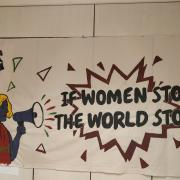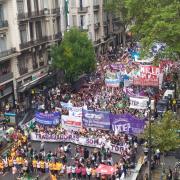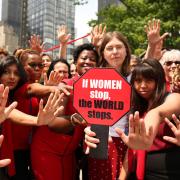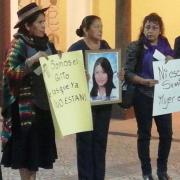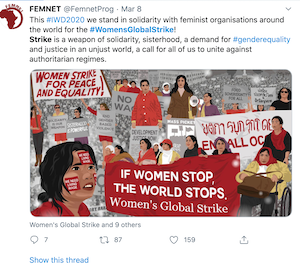Women’s Global Strike: Why building a feminist future matters in the midst of a global crisis
On International Women’s Day 2020, from the Philippines, India, Fiji, Nepal, United Kingdom, Mexico, Argentina, Ecuador to Paraguay, over one million women in all their diversities, from 60 countries went on a Women’s Global Strike to highlight the injustices women continue to face and demand structural change to advance women’s human rights. Today, as the world prepares for and responds to COVID-19 pandemic, the political demands articulated collectively by the Women’s Global Strike for a systemic change matter more than ever: COVID-19 is not gender neutral, and the pandemic is hitting disproportionally women around the world, especially those from poor and marginalized communities that experience intersectional discrimination.
ESCR-Net members worldwide engaged in shaping the political statement of the strike: “We want alternative development models that center people and planet, uphold human rights, food sovereignty and climate justice. We want decent work and living wages for all women. We want unpaid care work to be fairly recognized, reduced and redistributed. We want gender-based violence to end. We want corporate abuse to stop. We demand just access to resources, power, and opportunities. We demand that our voices be heard, heeded and protected. We want systemic change, and we want it now.”
The coordinated strikes were a reminder that 25 years after governments got together to adopt the Beijing Declaration and Platform for Action for women’s rights, these promises have not been kept and structural oppression against women persists.
The coronavirus outbreak might intensify worldwide this economic, political and social oppression, resulting in the domestic violence rise during the lockdown periods and as a result of increasing militarization; the economic hardship for women disproportionately represented in the informal sector and in precarious working conditions; magnifying the gendered division of labor and unpaid and paid care work, who tend to be women and are currently on the front line of the pandemic. The pandemic doesn’t discriminate, but intersecting systems of oppression do. Women facing multiple and intersecting discrimination, exclusion and violence are the most affected.
The strike connected a diverse range of struggles around women’s economic, social and cultural rights: women trade unionists, indigenous, peasant, fisherfolk communities defending their lands, activists promoting climate justice, and many other women worldwide mobilized.
Comité Ambiental en Defensa de la Vida, Colombia.
“As domestic workers, we are calling on those women who have suffered violence and harassment at work and have been exploited in many ways, to stand up for their rights, and those women who haven’t experienced such abuses, to mobilize in solidarity”, says Ida LeBlanc, President of the National Union of Domestic Employees of Trinidad Tobago, member that served as focal point for the Caribbean Region.
Cultural caravans, community theatre performances, concerts, demonstrations, marches and debates were among some of the diverse ways in which the participants rose up in protest in their regions and local communities around the world.
Even in contexts where limitations to public assembly had been already put in place due to the COVID-19 crisis, we saw members creatively and timely developing other alternatives to raise their voices and elevate their political demands through the strike’s website and social media channels
► Watch:
The coordinated global action engaged women leaders around the world, galvanizing into a collective resistance to respond and put forward our vision of a feminist future.
‘Our future demands a system change to shift the current power relations – where women and girls in all their diversity have power to make decisions over their own bodies, labor, resources and the future of their communities and the planet. We know that change will not come from political or economic “elites” but through organized collective actions of feminist and peoples’ movements. Women’s Global Strike has just opened up that path and will continue to organize cross-movement direct actions to end inequalities, discrimination, violence and oppressions’ said Misun Woo, Regional Coordinator, Asia Pacific Forum on Women, Law and Development (APWLD), member which initiated the campaign and served the focal point for the Asia region.
Women's Global Strike Twitter Channel
We thank and congratulate all members that actively engaged on the Women’s Global Strike and provided a strong leadership either at their countries and/or regions to show the world why women leaderhip in order to build a feminist future matters.The coordinated global action engaged women leaders around the world, galvanizing into a collective resistance to respond and put forward our vision of a feminist future.
What is next?
» While this women’s global strike has mobilized diverse women and communities across the globe, we will keep building solidarity and will reimagine the Women’s Global Strike 2021.We want to learn from this first experience and keep building women’s power! Engage in the assessment of the WGS 2020. Reach out to Viviana Osorio (vosorio@escr-net.org).
» Read our Shared analysis on Covid-19 and Women’s ESCR.
Stay tuned for the campaign report!

